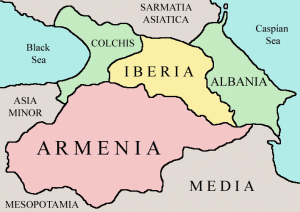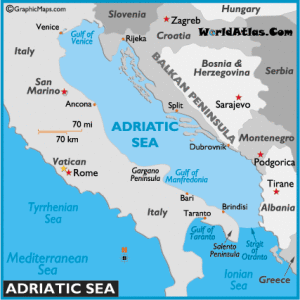Andi Zineli
Albania
Albania has not been excluded from the quest for links with Atlantis. Andi Zeneli had a website that delved into the ancient history of Albania which from the 10th century BC was part of Illyria. He makes great use of the controversial Oera Linda Book and linguistics in order to produce a convoluted association between Albania and Atlantis.
Zeneli had a separate website, also defunct, that dealt more specifically with the history of the ancient Illyrians.
There was also an ancient kingdom of Albania in the Caucasus between Iberia and and the Caspian Sea, approximately where Azerbaijan is now situated. It was once thought that the Adriatic Albanians had originated there but this was disproved on linguistic grounds in the 19th century.
 A more recent claim is that satellite imagery has revealed a network of lines near Durrés, west of Tirana, which are the remnants of Plato’s Atlantean canals, with co-ordinates of 41.08-41.02 N and 19.23 E. A blogsite(c) is also home to a number of articles adding further support to the Durrés theory.
A more recent claim is that satellite imagery has revealed a network of lines near Durrés, west of Tirana, which are the remnants of Plato’s Atlantean canals, with co-ordinates of 41.08-41.02 N and 19.23 E. A blogsite(c) is also home to a number of articles adding further support to the Durrés theory.
The Albanian hypothesis, however interesting has so far failed to answer many of the critical questions raised by Plato’s dialogues. Where were the Pillars of Heracles? What evidence is there for Albanian (Illyrian) influence extending to Tyrrhenia and Libya? Why did Plato not simply say that Atlantis had been located next door in the western Balkans? Without an answer to these and other questions we are forced to consider the Durres location is, at best, speculative.
However, in a desperate attempt to bolster this theory it has been pointed out(e) that the Illyrian tribe in the region was called Taulanti and the region itself Taulantis, inferring that it was modified to ‘Atlantis’!
In 2013 Skender Hushi announced that Albanian had been the language of Atlantis and Ireland!
A YouTube clip(d) offers a more graphic presentation of the theory while another link(f) offers a number of satellite images of Durres.
(c) https://atlantisinalbania.blogspot.com/2008/07/name-and-location.html
(d) https://www.youtube.com/watch?v=396VfgRH8Uw
(f) https://atlantisinalbania.blogspot.ie/2006/07/atlantis-is-in-albaniapt4eyes-dont.html
Adriatic Sea *
The Adriatic Sea was mainly dry land during the last Ice Age until it was inundated between 8500-6000 BC. The last decade has seen a number of sites in  the Adriatic region nominated as possible locations for Atlantis. A sunken town near Zadar would appear to be the latest candidate(d).
the Adriatic region nominated as possible locations for Atlantis. A sunken town near Zadar would appear to be the latest candidate(d).
Fatih Hodzic, a Slovenian writer, has offered of a new theory(a), which places Atlantis in the southern Adriatic Basin. He contends that the destruction of Atlantis was a consequence of an asteroid impact, recorded in Greek mythology as Phaëton, impacting in either the Ionian or the Tyrrhenian Sea just west of Sicily.
Recently, Alessio Toscano has suggested that the Pillars of Heracles were situated at the Strait of Otranto and that Plato’s ‘Atlantic’ was in fact the Adriatic Sea(c).
The Italian side of the Adriatic has also had claims made of an association with Atlantis such as with Valbruna. Daniela Bortoluzzi has written a lengthy article suggesting a possible link between Atlantis and Venice(h). More detailed is the claim by Morven Robertson that Atlantis had been situated between Padua and Ferrara, not far from Venice.
Mljet is a Croatian island close to Dubrovnik and believed by some to be Homer’s Ogygia, which in turn has been identified as Atlantis. This same island offers a competing claim to be the place where St. Paul was shipwrecked on his way to Rome, rather than Malta. At the risk of offending my Maltese friends, I consider the Mljet claim to have some considerable merit. Apart from anything else, at that time ships, for reasons of safety, preferred to stay close to shore, which suggests that to use the Strait of Otranto would provide the shortest open sea journey available, after that the Strait of Messina would bring them straight up the Italian coast to Rome! I find it hard to understand how at any point on that route that a storm could have threatened to carry them to Syrtis Minor (Southern Tunisia) which was about 400 miles at the nearest point.
Dubrovnik was recently claimed to have a number of pyramids in its vicinity by Pero Metkovic as well as the location of Atlantis. His rather rambling blog(g) offers no evidence apart from over-imaginative speculation.
Another claim is that satellite imagery has revealed a network of lines near Durrés, west of Tirana in Albania, which are the remnants of Plato’s Atlantean canals. The co-ordinates are 41.08-41.02 N and 19.23 E. A blogsite(b) is also home to a number of articles adding support for this Durrés theory.
Andi Zineli, in a now defunct website, advocated an Albanian solution to the mystery of Atlantis. He employed the Oera Linda Book to support his theory.
While the above suggestions are interesting, they are not convincing. Does it not seem strange that had Atlantis been located in the Adriatic, next door to Greece, that the Greeks in general and Plato in particular would have been unaware of it?
The Adriatic was also the backdrop to Homer’s Odyssey according to a new book[1396] by Zlatko Mandzuka, himself a native of the region. Even more radical is the claim that Troy itself had been located in Bosnia-Herzegovina or adjacent Croatia, the former by Roberto Salinas Price in 1985[1544], while more recently the latter is promoted by Vedran Sinožic[1543].
When the sunken ruins of a city, dated to around 1500 BC were discovered in 2015, near Croatia’s oldest city, Zadar, it generated the usual flurry of Atlantis speculation.
There was a media report(f) in early 2017 in which Mark Kempf claimed to have discovered the remains of Atlantis 30 miles off the coast of Croatia. Kempf is a treasure hunter and hopes that the discovery by him and his team will yield a fortune. I consider this report to be somewhat dubious.
>Nevertheless, although it cannot be directly linked to Atlantis, I feel obliged to add a May 2023 report that a “prehistoric road was discovered under layers of sea mud at the sunken Neolithic site of Soline, and helped connect the Hvar settlement to the now-isolated island of Kor?ula in Croatia(i). The ‘road’ has been dated to around 5000 BC.<
(a) http://en.atlantida.spletnestrani.com/atlantida/
(b) http://atlantisinalbania.blogspot.com/2008/07/name-and-location.html
(c) http://templeofapollobelenus.blogspot.ie/
(d) https://www.reddit.com/r/worldnews/comments/3u7rce/archeologists_in_croatia_announced_their/
(f) https://empirenews.net/lost-city-of-atlantis-uncovered-in-mediterranean-sea/
(i) 7,000-Year-Old Ancient Road Found Buried Underneath the Mediterranean Sea! | Weather.com
